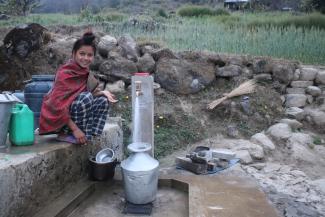Karishma's Journey
Naulakot, a village in Nepal's Kailali district, faces challenges like impassable roads during winter, monsoon difficulties and limited access to fresh water.
"The old community tap wasn't working. Now, with one tap per house, the village has undergone significant changes. This program has made a big difference for everyone, but especially for the children in their education, allowing more time for study and self-care," said Shanti Khadka, a local school teacher.
Naulakot now has a solar water lifting station, bringing water to the village. Thanks to support from the USAID Karnali Water activity, each of the 15 families and the Naulakot school has a faucet.
"Fetching water was tough. I spent a lot of time on it, and maintaining personal hygiene, especially during menstruation, was a real challenge," said Karishma, who fetched water from a downhill spring source. A weekly bath was a luxury she could scarcely afford.
"I am so hopeful about Karishma's future now. With improved access to water, she can focus more on her studies and pursue her dream of becoming a doctor," said Sunita, Karishma’s mother, about the impact of water access.
In addition to spending a lot of time fetching water, the lack of water caused many community members to practice open defecation, which can have negative health impacts due to poor sanitation. Now, due to the availability of water, they proudly utilize a well-maintained toilet constructed at their doorstep.
These changes encompass improvements in sanitation and hygiene, as well as advancements in agricultural practices, improving community resilience.
Despite his initial doubts about the project, Khadak Prasad Jaishi, the chairperson of the water users and sanitation committee, played a crucial role not only in leadership, he also dedicated his skills as a mason and pipefitter to the project. "Thanks to this project, we're now looking to improve agriculture in our village,” he said. “This underscores the success of the water initiative and the community's commitment to sustainable development and agricultural advancement.”
Naulakot Community is isolated from the market and has adapted to multiuse of water such as gray water and surplus water for irrigating small farmhouses.
Durga Khatri cultivates beans and green vegetables in her kitchen garden and shares Joshi's enthusiasm and commitment. 'We collect and reuse water for productive use, ensuring that every drop counts in nurturing our crops,” said Khatri.
Amidst these changes, Karishma's dreams have taken root and flourished. With improved access to water, coupled with her resilience, determination, and family support, her hopes and ambitions to become a doctor and make a difference in her community are strengthened. "I now have more time for my studies and can focus on my dream of helping others. Water has made everything better," she said, smiling.
The team at USAID Karnali Water activity collaborated closely with local government authorities to secure funds and formulate policies, including a water users master plan at the municipal level, aimed at achieving wider coverage.
Communities played a crucial role, providing leadership and in-kind contributions by actively participating in tasks such as canal excavation and transportation of construction materials. By December 2023, the efforts of USAID Karnali Water activity had benefited 64 communities throughout the Karnali river basin, positively impacting over 12,000 individuals by delivering sustainable improvements to their drinking water facilities right to their doorsteps.

© Pralhad Gairapipli/ 2024
Primary TextAt the heart of Naulakot resides Karishma, a fifth-grade student with dreams as vast as the surrounding hills. "I want to be a doctor and help people who are poor and in need," she said with determination.
KEY FACTS AS OF DECEMBER 2023- USAID Karnali Water Activity
- Constructed 64 sustainable water supply and sanitation schemes, providing improved drinking water facilities for 12,852 individuals at their doorsteps.
- Collaborated with six local governments to secure $418,582 for 64 water supply and sanitation schemes, with a 20% community contribution totaling $210,036 for 46 schemes.
- Established 179 Water User and Sanitation Committees, emphasizing a 66% representation of marginalized populations and a 51% female membership.
- Completed comprehensive citywide sanitation plans in seven municipalities.
- Supported 20 water, sanitation, and hygiene bills at the municipal level, with 15 receiving endorsements from respective councils.
- Facilitated the development of water use master plans approved by local governments in 29 municipalities.
- Assessed 11,841 spring sources, protected 30 water sources through various measures, and safeguarded 26.45 hectares of biologically significant areas.
- Conducted 694 capacity-building trainings and events, enhancing the understanding of water, sanitation, and hygiene for 49 water users and sanitation committee members, 29 local government officials, and community members.
- Continued efforts to establish and institutionalize the One Water Steering Committee in each of the four watersheds.

